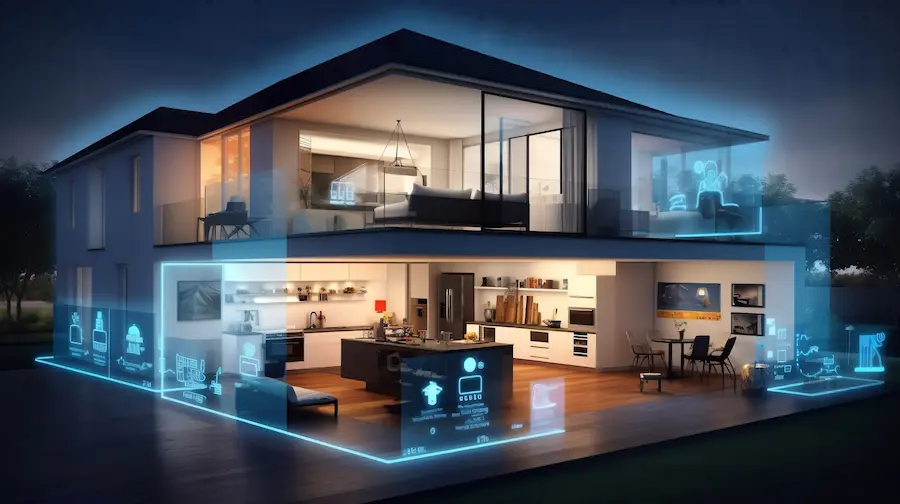Table of Contents
Key Takeaways:
- The shift towards digitalization is profoundly improving the home sales process and customer experiences.
- Emerging technologies like VR, AR, and AI offer immersive buying experiences.
- Data analytics are pivotal in strategic decision-making and enhancing sales effectiveness in real estate.
- Mobile technology ensures constant connectivity, providing on-demand access to property information and real estate services.
- Eco-friendly technology in home construction appeals to the environmentally conscious buyer and can lead to long-term cost savings.
- Cybersecurity remains a top priority in protecting sensitive client information in an increasingly digital world.
Introduction
The real estate industry is constantly evolving to meet market demands. Modern technology is integrated into the industry to meet consumers’ changing needs. Digital tools and software solutions are being used to enhance customer satisfaction, improve home sales efficiency, and promote ecological sustainability.
The Digital Landscape of Home Sales
Digital interfaces and online engagements replace traditional processes and in-person meetings in the home sales industry. To cater to the tech-savvy generation, Home Builder Software is being integrated to streamline operations and provide an engaging experience for prospective buyers. Comprehensive online listings and virtual tours are now standard, allowing buyers to explore properties at their leisure and obtain detailed information before visiting. These platforms offer 360-degree panoramic views, providing a precise sense of space and dimension without needing physical presence.
Integrating Technology for Improved Customer Experience
The impact of technology on customer experience is profound. Tools such as interactive floor plans and 3D home configurators allow potential buyers to visualize real-time adjustments to properties, tailoring homes to their tastes before an actual visit. Real estate agents now need to use Customer Relationship Management (CRM) systems to track their clients’ interactions, preferences, and feedback. As a result, sales are approached with more excellent strategy and personalization, significantly raising customer satisfaction.
Data-Driven Decisions in Home Sales
Gone are the days when gut feelings and localized knowledge were the primary drivers of real estate decisions. Today, data is king. With advancements in big data and sophisticated analytic tools, real estate professionals can mine and interpret large volumes of data to better understand market dynamics and consumer trends. The insights from data analytics influence everything from property pricing to targeted marketing campaigns, leading to more effective and efficient sales processes.
Virtual Reality and Augmented Reality: The New Frontier
VR and AR technologies represent the cutting edge of innovative real estate marketing and sales. By presenting interactive models of properties, potential buyers are immersed in an experience beyond static images. They can explore different finishes, color schemes, and layouts, making it easier to envision their future homes. These technologies have been particularly transformative for selling properties still under construction, allowing buyers to virtually step into their future homes.
Mobile Technology: Accessibility and Convenience
The proliferation of mobile technology has had a significant impact on real estate. Homebuyers now expect to access property information, schedule viewings, and communicate with realtors anytime from anywhere using their smartphones. This shift has prompted the development of mobile applications that aggregate listings, provide real-time notifications, and support video calls, delivering unparalleled convenience and efficiency in home buying.
AI and Machine Learning in Real Estate
AI and machine learning algorithms transform how real estate professionals analyze data, predict market trends, and understand customer preferences. Using AI, predictive models can forecast future market movements, help set accurate property prices, and identify the ideal time for listings. Similarly, machine learning can improve client interaction by personalizing communication and providing recommendations based on individual buyer behavior and patterns.
Eco-Friendly Tech Innovations
Environmental considerations play an ever-greater role in consumers’ purchasing decisions, which extends to the real estate industry. Smart homes, which include solar panels, energy-efficient appliances, and environmentally friendly building materials, are becoming increasingly popular due to their long-term financial benefits and smaller environmental impact. Homebuilders can gain a competitive edge by incorporating these eco-friendly solutions into their constructions, appealing to a growing demographic of environmentally conscious buyers.
The Role of Social Media in Real Estate Marketing
For real estate agents, social media networks can be handy resources. They provide a way to present homes, exchange endorsements, and interact with possible purchasers. Realtors can use social media to reach diverse audiences by creating content that resonates personally, whether through organic posts or targeted ads. Building a community around new housing developments, generating leads, and raising brand awareness are all made possible with social media.
Maintaining Security in an Online World
As real estate becomes increasingly digitized, it’s crucial to maintain robust cybersecurity measures. Professionals must implement advanced security protocols to safeguard their clients’ data. Embracing technology is essential for the industry to thrive and craft an efficient, secure, and engaging home-buying landscape.

